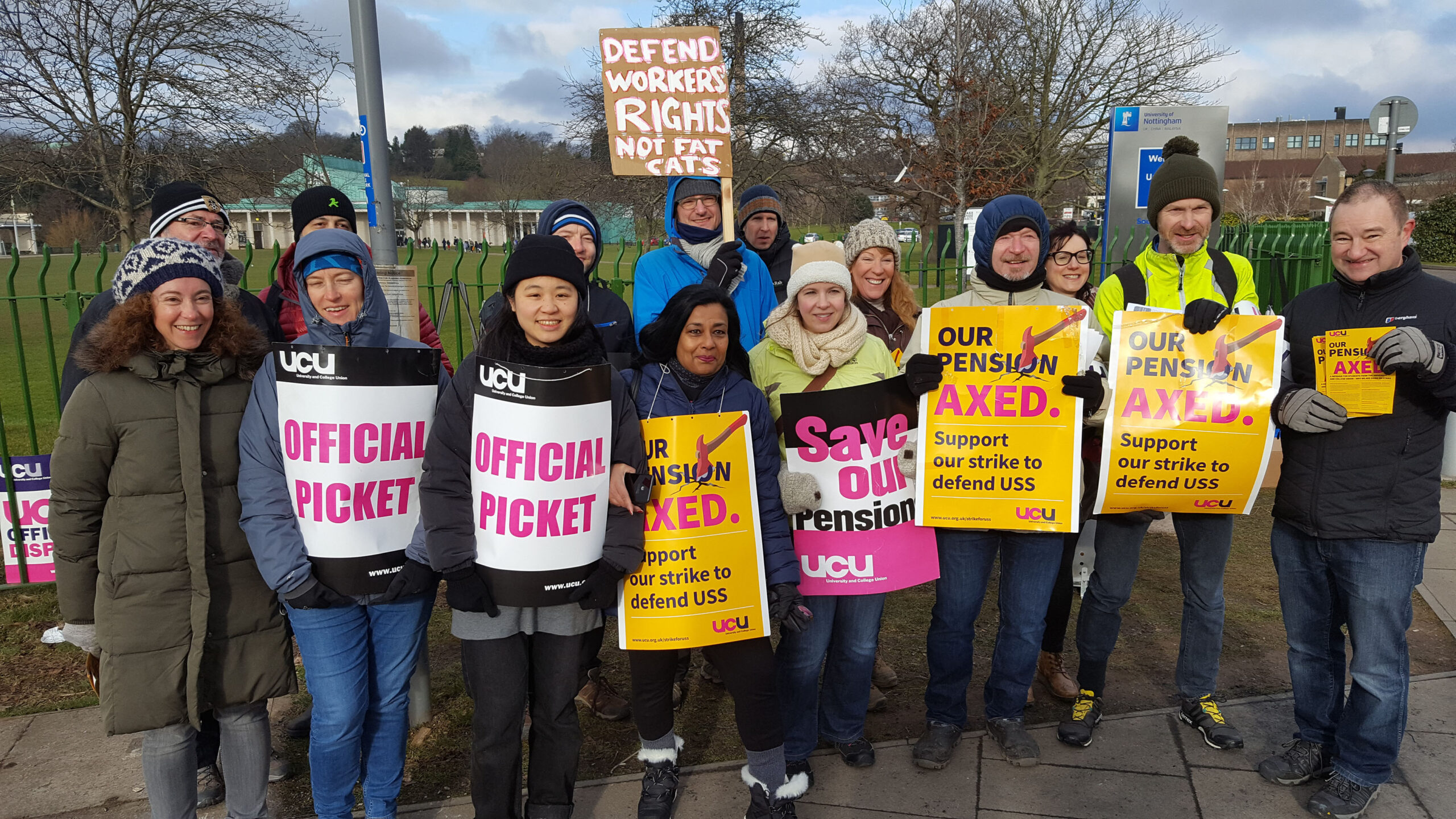UCU strike: reject the deal – keep the action on
Sam Morecroft, Sheffield branch delegate (personal capacity)
On 28 March, delegates from striking University and College Union (UCU) branches met to be consulted on a new deal, put forward by Universities UK (UUK) to resolve the pensions dispute. The deal, which includes maintaining the current pension scheme for a year and setting up a joint working group comprised of both UUK and UCU representatives to look at how the fund is valuated, is a huge step forward from UUK’s decision on 23 January to announce plans to completely scrap defined benefit.
It is a testament to the power of UCU members’ sustained industrial action that the employers have been pushed this far, and demonstrates beyond doubt that the Trade Union Act is not an insurmountable barrier to national industrial action.
However, while the UCU Higher Education Committee met following the branch consultation and voted by a narrow margin (10-8 with one abstention) to ballot members on the strike, this decision did not reflect the feedback from branches at the consultation. Overwhelmingly, while there was a real sense that the latest offer demonstrated genuine progress, the majority of branches favoured a ‘revise and resubmit’ position, asking for more detail and discussion of the offer before it was put to the membership.
There are many valid questions around what the offer means – not least what will happen after April 2019 which was originally when the employers wanted to impose 100% defined contribution pensions in any case. There is a lack of clarity around what power the joint working group will have to challenge the methodology used to claim that the USS fund is in deficit and to re-evaluate the scheme collectively, as well as what UUK themselves have committed to. And worryingly there seem to be preconditions to this evaluation based on the employers notion of “affordability” – why should we tie ourselves in to further negotiations that come with strings attached?
In the branch consultation, an undated letter was produced from UUK CEO Alistair Jarvis claiming that UUK “did not intend” to revert to their proposal for 100% DC pensions in the future. This was used by Sally Hunt, UCU general secretary, as evidence that this was not simply an attempt to buy time by the employers and UUK would approach negotiations in good faith. However, many delegates expressed frustration at this last minute evidence, and asked how they could possibly know what their members would want to happen when they had no way of discussing the full details of the offer beforehand. Some even suggested it was meaningless.
In reality, this consultation of branches has been rushed, and there is a feeling among many members that it has been railroaded through by the full time officials of the union. The offer from UUK came out just a few days before the branch consultation and was sent out to members before elected negotiators had any chance to discuss the proposal and respond. Many branches were unable to call meetings of members in time and relied on hastily thrown together electronic surveys which threw up a host of different responses. The consultation, which lasted around three hours, was highly pressurised and as the time constraints became more apparent, delegates were asked to express their branches position in three sentences or less!
Even worse, while the chair noted in the meeting that many branches favoured a revise and resubmit position, when a delegate requested an indicative vote be taken on this, the Chair refused the request and stated that HEC representatives had heard the views of the branches. HEC members were then told that a majority of branches wanted to ballot the membership on this – a complete untruth and a disgraceful tactic used by full time officials who clearly want to fudge a solution to the dispute as quickly as possible! With little or no time for discussion, the HEC then voted on completely factional lines, with the ‘Independent Broad Left’ (IBL), the right-wing faction which supports Sally Hunt, voting to support a paper put forward by the full time officials calling for an immediate ballot of members, the UCU Left voting against, and the one unaligned HEC member abstaining. As a result of this the HEC was told that all other motions submitted by HEC representatives fell without discussion or vote as the paper overrode these. Members will be balloted immediately after the Easter Bank Holiday, again giving no real chance for branches to discuss the offer before the ballot begins.
Put simply, this was a stitch up by Sally Hunt and the full time officials. Members will understandably want to know why. The reality is that Hunt and the IBL favour a form of ‘partnership’ unionism based on compromise with the employers rather than industrial action. The scale of this attack and members’ anger forced them into supporting strikes, but as soon as a compromise deal became available they were keen to accept, despite the fact that all the momentum in the dispute was with the union and further concessions could have been extracted.
Furthermore, while this dispute is between UUK and UCU, the significance of it is felt well beyond the employers and the union. The strike has taken on a life of its own and has felt like the beginnings of a mass movement against marketisation, privatisation and austerity in education. It has re-ignited the student movement, acting as the spark for the largest local student mobilisations since 2010 and over 20 campus occupations have taken place since the strike began. It is not an exaggeration to say that if this movement were to continue to develop it could act as a catalyst for an eruption of strikes which could bring down the weak and divided Tory government.
Indeed, the Tories have been remarkably silent on the USS dispute, preferring to avoid drawing attention to one of the biggest strikes in recent history. But behind the scenes Universities Minister Sam Gyimah has been applying pressure to accept the compromise deal, clearly afraid of what might happen to his government if the dispute continues. That may partially explain why the leadership are so desperate to get this offer out to a ballot of members in a bid to end the strike, even though we don’t yet know enough about what UUK’s offer means. But it’s still a mistake – we have leverage right now and should be using that to maximum effect
When the previous offer came out in the middle of the strike, branches were quick to mobilise against it and spoke as one in their rejection of it, with mass meetings up and down the country and a protest outside UCU HQ sending a clear message of #NoCapitulation. However, this time there was no demo outside the UCU offices and the message was much less clear – while most could be broadly described as revise and resubmit there was not a clear unanimous message from members. This made it easier for the leadership to claim that no clear position came from the consultation and to push for a ballot.
Unfortunately, UCU Left confused the situation further by raising a demand for a #NoDetriment clause, arguing the strikes should stay on until UUK agreed that whatever the findings of the joint group there would be no cut in pension benefits or increased contributions for our members. This was an understandable position but a confused one – even if UUK had been forced to offer such a clause through further action it would likely not have meant anything. Worse, at the branch consultation Sally Hunt seized upon the #NoDetriment demand, which only a minority of branches were in fact calling for, stating (probably not incorrectly) that we would have to strike for much longer to achieve such a thing. This had the effect of further dividing and confusing the delegates in the room, with some openly criticising the demand.
That’s frustrating, but it also shows the desperate need for an organised broad left network in the union which is rooted in the membership and able to provide a strategy throughout industrial struggles – sadly UCU Left exists mainly in London and is not yet able to do this. In the absence of more established rank and file organisation in UCU Twitter has become an important platform for communicating between members branches – ironic since many academics are forced to sign up to Twitter by management to promote their research. But now members are learning that Twitter cannot substitute for ‘real life’ discussions of strategy and strong rank and file organisation.
What is now being offered by UUK is a huge step forward from their attempt to completely scrap Defined Benefit. But at the same time there are huge questions over what the offer means and at worst it is possible this is just a stalling tactic by the employers that will allow them to regroup and come again to attack our pensions. We have taken huge steps forward together and pushed the bosses back – but we need to reject this deal and keep the action on until UUK provide further guarantees on what this joint working group really means and what they intend for our pensions after April 2019. Vote no, keep the action on!








